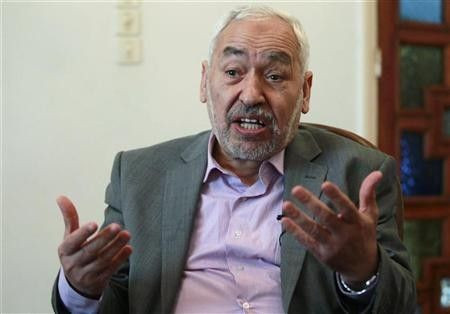Tunisia's Ghannouchi too liberal for some Islamists

Tunisian Islamist leader Rachid Ghannouchi is seen by many secularists as a dangerous radical, but for some conservative clerics who see themselves as the benchmark of orthodox Islam -- he is so liberal that they call him an unbeliever.
Ghannouchi's Ennahda party won Tunisia's first free elections, 10 months after an uprising brought down ruler Zine al-Abidine Ben Ali, who had banned the group and imprisoned Ghannouchi before he took up home as an exile in London.
The party said on Tuesday it had won more than 40 percent of seats in Sunday's election, pledging to continue democracy after the first vote that resulted from the Arab Spring revolts sweeping the Middle East and North Africa.
There will be no rupture. There will be continuity because we came to power via democracy, not with tanks, campaign manager Abdelhamid Jlazzi said.
Ghannouchi's moderate brand of Islamist thought, which matured during 22 years in exile in London, led in part to him once being deported from Saudi Arabia when he tried to make a pilgrimage to Mecca.
He stands out in the Islamist spectrum -- which ranges from the political ideologues of Egypt's Muslim Brotherhood to puritanical Salafists in Saudi Arabia -- for his view that there should be no bar on women or non-Muslims as head of state since citizenship must take priority over Islam.
Salafis, Wahhabis and even some Brotherhood don't like the guy, some might even say he's a 'kafir' (apostate), said an Egyptian friend of Ghannouchi's from his years in London, who did not want to be named.
Acquaintances describe Ghannouchi as a formerly left-leaning Arab nationalist who like many Arab intellectuals shifted towards political Islam in the 1960s and 1970s during stints of study in Cairo, Damascus and Paris.
As with most leaders in the political Islam movement, Ghannouchi is not a cleric by training, though he is a member of the International Union of Muslim Scholars headed by Qatar-based Egyptian cleric Yousef al-Qaradawi.
The clerics of petrodollar power Saudi Arabia view Ennahda as lightweight, said Mohsen al-Awajy, a Saudi Islamic thinker who often debates with Ghannouchi at Muslim Scholars Union meetings.
The conservatives here will resist those outside who are more open and modern. But we shouldn't look to those who are trying to undermine him, he said, noting that Saudi authorities once deported Ghannouchi when he arrived to make pilgrimage.
Awajy said Ghannouchi had the respect of influential clerics such as Qaradawi -- who appears regularly on leading Arabic broadcaster Al-Jazeera -- and Sheikh Salman al-Odah in Saudi Arabia, who led a movement for democratic reforms in the 1990s that the ruling Al Saud family managed to quash.
Ghannouchi's Egyptian friend recalled how his newspaper articles angered Brotherhood leaders in the 1990s.
He said Ghannouchi had written some of the best critiques of the strict Saudi form of Islam known as Wahhabism, and is no longer invited to the annual Saudi intellectual seminar known as the al-Janadiriyya, which Riyadh uses to bestow largesse and spread influence.
Although Ghannouchi's Ennahda was inspired by Egypt's Muslim Brotherhood, the Brotherhood has by contrast struggled in recent years with the idea of equal rights for women and allowing Coptic Christians access to the highest offices of state.
DISSEMBLER IN A SHAKY COALITION?
Nonetheless, many Tunisian intellectuals and secularists think Ghannouchi's is dissembling about his true opinions. They also suspect that his movement is receiving funding from the international network of the Muslim Brotherhood and Gulf Arab supporters.
Ennahda has bent over backwards in recent weeks to assuage the concerns of secularists who have had the upper hand in society since Tunisia's independence leader Habib Bourguiba set the North African state aggressively on a pro-Western path.
The party ran an unveiled woman as an election candidate, vowed not to touch laws banning polygamy and ensuring equal rights in divorce and inheritance that some say are at odds with Islamic Sharia, and presented a programme differing little from that of secularists.
Ghannouchi compares Ennahda to Turkey's ruling Justice and Development Party of Prime Minister Tayyip Erdogan. Erdogan describes his own party as a mainstream centre-right group with roots in religion, not unlike the Christian Democratic parties found in many European countries.
Yet Tunisian commentator Rachid Khechana said many in Ennahda give different messages in their own communities.
They use different rhetoric in the rural areas where it's more conservative: rhetoric about stopping culture from outside, corruption of youth and defending Islam, he said.
In the mosque, they tell their believers they should not fear what they hear them saying on TV.
Salafists -- strict Sunni Muslim adherents who oppose elections in principle -- have flexed their muscles in recent months, attacking a cinema and a TV station over material they considered blasphemous. Ennahda has denied any connection. Critics don't believe them.
Abdul-Rahim Ali, a Cairo-based researcher into Islamist movements, said Ghannouchi's problem could come from hardliners within a political movement that has tried to embrace different trends, itself a shift from the Brotherhood which is famed for its internal discipline and ideological policing of cadres.
I think his opinions are honest, but his ideas only won out in order to attract the secularists. The hardliners could take over decision-making inside Ennahda, he said, citing preachers such as Sfax-based Habib Allouz.
Saudi preacher Awajy said despite the disputes, Islamists of all persuasions would see Ennahda's victory as a turning point on the long march to Islamise modern Arab societies.
Tunisia used to be the country of secularism. Bourguiba and
Ben Ali did their best to move the whole society, he said. But decades of action brought a result, and to see Ghannouchi resisting and now succeeding -- we have to praise and congratulate him.
© Copyright Thomson Reuters {{Year}}. All rights reserved.





















